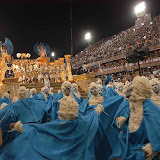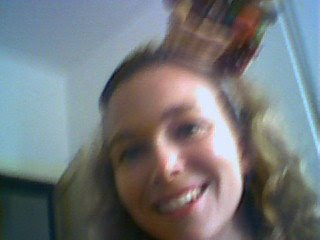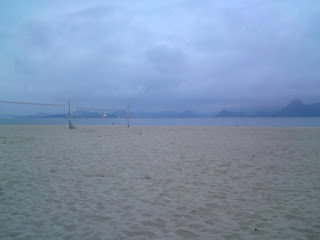Monday, 26 October 2009
Saturday, 1 August 2009
Monday, 15 June 2009
Sunday, 29 March 2009
Wednesday, 25 March 2009
Futuro das aguas

This picture was taken from my mobile phone, and uploaded to my blog from my mobile phone! The wonders of technology... I am a bit late I know, but I am really excited about this feature on my new phone!
The event was a conference about the future of water, which took place this week here in Rio. Different speakers, experts, came to talk about water, from an economic, scientific or artistic point of view.
Sunday, 15 March 2009
The Making of The Museum
This is my other blog about the making of the museum of the sea - the project I am working on with UFRJ. I'll be using it it to keep a record of the process of creating the museum.
Wednesday, 11 March 2009
Hard day at work

Yesterday we went around the Ilha do Catalão by boat with Alejandro, who does research on the pollution of the Guanabara Bay around the Fundão. We wanted to see the area that is going to belong to the Museum and that we can use for biology and ecology activities. The idea is to have navigation classes starting from there as well, and all sorts of navigation-related activities.
The area around the Museum probably used to be beautiful. It still is, in a way, but it is so polluted that it is difficult to see it. It's still rich in endemic flora, such as mangrove, guava and pitanga trees, and it's home to various species of birds and fish.
Monday, 9 March 2009
Afro Samba
(by Baden Powell and Vinicius de Moraes)
Tempo De Amor
Ah, bem melhor seria
Poder viver em paz
Sem ter que sofrer
Sem ter que chorar
Sem ter que querer
Sem ter que se dar
Ah, bem melhor seria
Poder viver em paz
Sem ter que sofrer
Sem ter que chorar
Sem ter que querer
Sem ter que se dar
Mas tem que sofrer
Mas tem que chorar
Mas tem que querer
Pra poder amar
Ah, mundo enganador
Paz não quer mais dizer amor
Ah, não existe coisa mais triste que ter paz
E se arrepender, e se conformar
E se proteger de um amor a mais
O tempo de amor
É tempo de dor
O tempo de paz
Não faz nem desfaz
Ah, que não seja meu
O mundo onde o amor morreu
Ah, não existe coisa mais triste que ter paz
E se arrepender, e se conformar
E se proteger de um amor a mais
E se arrepender, e se conformar
E se proteger de um amor a mais
Sunday, 8 March 2009
To Roque
Monday, 2 March 2009
Mummies in blue
 |
| Mumias |
If you look carefully you might find me me among the blue mummies... This is Vila Isabel' s 'Aida car' for the 2009 Carnival parade. It was a success, people loved our scary outfits, which turned into the sea when we threw our capes over our heads. Vila Isabel didn't win the Carnival parade this year, but it came fourth, not bad. The parade was beautiful.
Religion 2
Religion
Saturday, 21 February 2009
Today I'm a fairy
Thursday, 19 February 2009
Ode to Rio

Last night was a big night. I didn't think it would be. I went to Manu Chao's show thinking it would be fun to jump to music I used to listen to 10 years ago, but nothing more. The show was impressive. 'Manu Chao and Radio Bamba' have their formula - a clever mix of catchy rythms, punctuated by uber classic reggae beats and hectic brazilian drums - it works every time. But this time they added hectic electric guitars and beautiful spanish-style acoustic guitar, and the result was brilliant, full of energy. They left the audience absolutely exhausted, after a 3-hour long show, but rejoyced.
I hadn't realised at the time - ten years ago! - that Minha galera is in fact an ode to Rio and Brazil, but Manu Chao style, i.e simplistic and repetitive:
[...]
Minha torcida,
Minha querida,
Minha galera,
Minha cachoeira,
Minha menina,
Minha flamenga,
Minha capoeira,
Ó minha menina,
Minha querida,
Minha galera,
...
Minha querida,
Minha galera,
Minha cachoeira,
Minha menina,
Minha flamenga,
Minha capoeira,
Ó minha menina,
Minha querida,
Minha galera,
...
but of course Cariocas love it...
It's carnival!
 It's nearly Carnival and soon I'll be parading on the Avenida, dressed as a mummy... in a reenactment of the first performance of Aida at the Teatro Municipal, here in Rio, in 1910. The parade of Vila Isabel, the school I'm parading for, is themed around the Teatro Municipal, Rio's main theatre, because this year is the 100th anniversary of the monument. The show is a huge enterprise. There will be 8 cars parading down the avenue of the Sambodromo, with around 5000 dancers! One car will be a miniature version of the Teatro,
It's nearly Carnival and soon I'll be parading on the Avenida, dressed as a mummy... in a reenactment of the first performance of Aida at the Teatro Municipal, here in Rio, in 1910. The parade of Vila Isabel, the school I'm parading for, is themed around the Teatro Municipal, Rio's main theatre, because this year is the 100th anniversary of the monument. The show is a huge enterprise. There will be 8 cars parading down the avenue of the Sambodromo, with around 5000 dancers! One car will be a miniature version of the Teatro,which was inspired by the Opéra of Paris; there'll
also be a massive swan (after Swan Lake) and an egyptian temple (that's my car, it's the setting of Aida). I am very impressed with the amount of energy and resources that were put into setting up these Carnival parades. So many people were involved: choreographers, designers, costume-makers, theatre people, and of course, musicians and carnival specialists - the carnavalescos. Carioca are usually really disorganised and unprofessional, but when it comes to Carnival.... it's another story!
that's me, not as a mummy but with my Carmen Miranda headgear on
Monday, 9 February 2009
Museu do Mar

This is my new project: the 'Museum of the sea'. Well it's one of the things I'll be working on this year. The idea is great: we want to create a hands-on science centre for kids from poor communities around the university. The kids will learn about boats, about the sea and about the environment. All very hands-on: they'll get to learn how to build miniature boats, how to sail, they'll observe stuff under a microscope and will get to do some real science out in the mangrove around the centre. The area is very beautiful, but very polluted too. It's in the Guanabara Bay and like the rest of the bay it has been badly affected by pollution - everyone dumps absolutely everything in the bay, and has been for years. Sewage, chemicals, rubbish, it all ends up there. So the idea is, of course, to raise awareness among the kids by showing from close what is happening to their local environment, and teaching them that there are alternatives to dumping everything in the sea...
Thursday, 15 January 2009
Our last works of art

I am a bit late... I should have posted these earlier, as I am very proud of them: the last pieces of work we produced with our students in Macaé are great! Below is the article that we wrote with a group of 5 13-14 year olds, about water pollution in the city. This was the project I most enjoyed this year. Normal, really, it is the one that most has to do with what I know and what I do.
But I enjoyed the others too, although it got a bit hard towards the end, when everyone saw that they were running out of time to finish the pieces. Many animation films were produced, a class did a musical, another made Cordel books - a type of popular poetry that is published in really nice little books with nice naive illustrations... Another painted graffitis on a wall of the school, inspired by famous Rio graffitis (see pic). It was a productive end of year!
POLUIÇÃO DA ÁGUA EM MACAÉ:
... SITUAÇÃO CRÍTICA, MAS NINGUÉM FAZ NADA...
Por Camila Paz, Camila Farias, Marcelly, Paulo, Rodolfo e Juliette Savin, em Macaé
Marcio pesca na beira do Rio Macaé quando tem um horário vago, por diversão. De vez em quando pesca bagre, mas e muito raro. Em Macaé, que se localiza no estado do Rio de Janeiro a poluição esta aumentando cada vez mas, poluindo rios e mares, cidade e bairros. A poluição prejudica a população e os pescadores que necessitam dos peixes para viver.
Macaé está situada no estuário do Rio Macaé e essa área é frágil. “Áreas estuarinas são frágeis, porque são áreas de baixa energia, onde tem baixa circulação de água”, diz Alexandre de Azevedo pesquisador do NUPEM, Núcleo de Pesquisas Ecológicas de Macaé. Em Macaé, o maior problema e a falta de coleta e tratamento de esgoto. Tudo acaba no rio. Isso tem repercussões dramáticas nas espécies marinhas que vivem la. “O estuário do rio Macaé e lugar de reprodução e de alimentação de muitas espécies marinhas, de peixe e camarão” explica Dr Azevedo. Vários tipos de peixe precisam do rio para se reproduzir e buscar comida: bagre africano, parati, corvina, traira, madi... E claro que a quantidade destes peixes no rio esta diminuindo, e vários estão em extinção agora. “Então a poluição do estuário tem um impacto grande sobre o estoque pesqueiro”. Marcio concorda: “hoje em dia é muito mas difícil pegar peixe aqui do que ha cinco anos atrás, mudou muito”. “A culpa é de todos nos” continua ele, “a prefeitura esta fazendo o que pode, mas o pessoal não respeita, joga aqui, contamina lá no mar também”.
A prefeitura tinha que incentivar as escolas para educar as crianças desde pequeno sobre a proteção do meio ambiente. “Poluição, da para resolver com educação das crianças” diz Jorge, 67 anos, morador de Macaé aposentado. A educação é importante na escola e da escola tem que estar levada para casa, diz ele. Talvez não esteja tão simples. “A educação tem quer ser de choque. A educação ambiental feita nas escolas hoje não é suficiente”, diz Alexandre de Azevedo.
O que falta também é educação para a gestão, “educação para os políticos e os empresários, são eles que precisam”. A Petrobras, por exemplo, tem muita culpa nos problemas de poluição em Macaé. “Onde se instala exploração mineral vira um caos ambiental”, explica Dr Azevedo, “então a Petrobras tem culpa sim, tem responsabilidade na co-gestão dessa cidade. Mas sempre foi briga de ego entre a Petrobras e a prefeitura conta ele, e não ha cooperatividade.” A poluição aumentou devido à população que cresceu cada vez mais desde a instalação da Petrobras em Macaé. Desde essa época muitas pessoas têm vindo para cá em busca de emprego. Isso, associado à falta de investimento da prefeitura em infra-estrutura na cidade, tem sido a principal causa da poluição em Macaé.
As leis ambientais no Brasil são consideradas as melhores do mundo por muitos, explica Mauricio Passeado, da Secretaria Municipal do Meio Ambiente de Macaé. “ O problema e que ninguém compre, e falta técnicos e dinheiro para controlar”... Com 200.000 habitantes, Macaé é considerada uma cidade grande, e recebe orçamento do governo em proporção a o seu tamanho – em 2007: R$ 865 milhões. Alem disso, recebe royalties pela exploração de petróleo – mais de R$ 410.000.000 em 2006, segundo o site da prefeitura. Então dinheiro, em Macaé, ‘a cidade do petróleo’, não é problema. Tem dinheiro para ordenar a cidade, a ocupação do solo, introduzir coleta seletiva de esgoto e de lixo, e para controlar se as leis estão cumpridas por todos também. Claramente, o problema e a vontade política, vontade de mudar. “Ver que ninguém faz a sua parte me desanima” diz Marcio, olhando os barcos saindo para pescar. “Mas hoje em dia, o ser humano esta ligado em outras coisas...”.
Poluição da água não significa só falta de peixe para pescar, significa também falta de higiene básica, e doenças. Poluição da água pode causar doenças de pele, rinite alérgica, disfunções gastrointestinais, e doenças muito mas serias como cólera, febre amarela, hepatite, esquitossomose...
Os barcos podem sair para pescar ignorando o fato de que pegam cada vez menos peixe; o Marcio pode voltar amanha para lançar o seu anzol da ponte da barra, ignorando o cheiro e o lixo flutuando no rio; mas uma coisa que eles não podem ignorar, é que a responsabilidade para o que esta acontecendo na cidade e deles também. Seria bom lembrar disso nas próximas eleições municipais...
Por Camila Paz, Camila Farias, Marcelly, Paulo, Rodolfo e Juliette Savin, em Macaé
Marcio pesca na beira do Rio Macaé quando tem um horário vago, por diversão. De vez em quando pesca bagre, mas e muito raro. Em Macaé, que se localiza no estado do Rio de Janeiro a poluição esta aumentando cada vez mas, poluindo rios e mares, cidade e bairros. A poluição prejudica a população e os pescadores que necessitam dos peixes para viver.
Macaé está situada no estuário do Rio Macaé e essa área é frágil. “Áreas estuarinas são frágeis, porque são áreas de baixa energia, onde tem baixa circulação de água”, diz Alexandre de Azevedo pesquisador do NUPEM, Núcleo de Pesquisas Ecológicas de Macaé. Em Macaé, o maior problema e a falta de coleta e tratamento de esgoto. Tudo acaba no rio. Isso tem repercussões dramáticas nas espécies marinhas que vivem la. “O estuário do rio Macaé e lugar de reprodução e de alimentação de muitas espécies marinhas, de peixe e camarão” explica Dr Azevedo. Vários tipos de peixe precisam do rio para se reproduzir e buscar comida: bagre africano, parati, corvina, traira, madi... E claro que a quantidade destes peixes no rio esta diminuindo, e vários estão em extinção agora. “Então a poluição do estuário tem um impacto grande sobre o estoque pesqueiro”. Marcio concorda: “hoje em dia é muito mas difícil pegar peixe aqui do que ha cinco anos atrás, mudou muito”. “A culpa é de todos nos” continua ele, “a prefeitura esta fazendo o que pode, mas o pessoal não respeita, joga aqui, contamina lá no mar também”.
A prefeitura tinha que incentivar as escolas para educar as crianças desde pequeno sobre a proteção do meio ambiente. “Poluição, da para resolver com educação das crianças” diz Jorge, 67 anos, morador de Macaé aposentado. A educação é importante na escola e da escola tem que estar levada para casa, diz ele. Talvez não esteja tão simples. “A educação tem quer ser de choque. A educação ambiental feita nas escolas hoje não é suficiente”, diz Alexandre de Azevedo.
O que falta também é educação para a gestão, “educação para os políticos e os empresários, são eles que precisam”. A Petrobras, por exemplo, tem muita culpa nos problemas de poluição em Macaé. “Onde se instala exploração mineral vira um caos ambiental”, explica Dr Azevedo, “então a Petrobras tem culpa sim, tem responsabilidade na co-gestão dessa cidade. Mas sempre foi briga de ego entre a Petrobras e a prefeitura conta ele, e não ha cooperatividade.” A poluição aumentou devido à população que cresceu cada vez mais desde a instalação da Petrobras em Macaé. Desde essa época muitas pessoas têm vindo para cá em busca de emprego. Isso, associado à falta de investimento da prefeitura em infra-estrutura na cidade, tem sido a principal causa da poluição em Macaé.
As leis ambientais no Brasil são consideradas as melhores do mundo por muitos, explica Mauricio Passeado, da Secretaria Municipal do Meio Ambiente de Macaé. “ O problema e que ninguém compre, e falta técnicos e dinheiro para controlar”... Com 200.000 habitantes, Macaé é considerada uma cidade grande, e recebe orçamento do governo em proporção a o seu tamanho – em 2007: R$ 865 milhões. Alem disso, recebe royalties pela exploração de petróleo – mais de R$ 410.000.000 em 2006, segundo o site da prefeitura. Então dinheiro, em Macaé, ‘a cidade do petróleo’, não é problema. Tem dinheiro para ordenar a cidade, a ocupação do solo, introduzir coleta seletiva de esgoto e de lixo, e para controlar se as leis estão cumpridas por todos também. Claramente, o problema e a vontade política, vontade de mudar. “Ver que ninguém faz a sua parte me desanima” diz Marcio, olhando os barcos saindo para pescar. “Mas hoje em dia, o ser humano esta ligado em outras coisas...”.
Poluição da água não significa só falta de peixe para pescar, significa também falta de higiene básica, e doenças. Poluição da água pode causar doenças de pele, rinite alérgica, disfunções gastrointestinais, e doenças muito mas serias como cólera, febre amarela, hepatite, esquitossomose...
Os barcos podem sair para pescar ignorando o fato de que pegam cada vez menos peixe; o Marcio pode voltar amanha para lançar o seu anzol da ponte da barra, ignorando o cheiro e o lixo flutuando no rio; mas uma coisa que eles não podem ignorar, é que a responsabilidade para o que esta acontecendo na cidade e deles também. Seria bom lembrar disso nas próximas eleições municipais...
Subscribe to:
Comments (Atom)
















